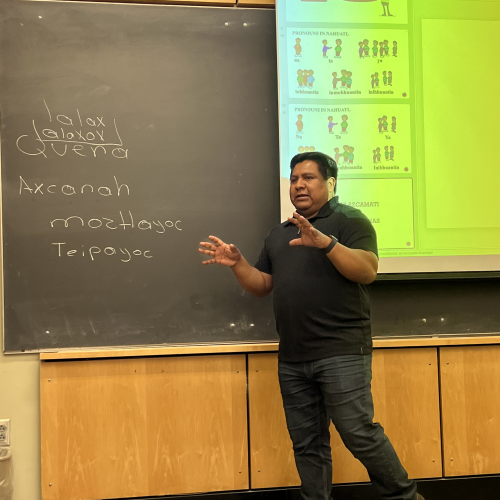Nahuatl
Spoken by 1.7 million native speakers today, Nahuatl offers a window into the worldview and history of indigenous communities in Mexico and its diaspora, whose cultural heritage has survived centuries of colonization
Nahuatl
Spoken by 1.7 million native speakers today, Nahuatl offers a window into the worldview and history of indigenous communities in Mexico and its diaspora, whose cultural heritage has survived centuries of colonization
Why Study Nahuatl?
Any student with an interest in learning an indigenous language that is both ancient and living will benefit from this learning opportunity. In particular, we have observed that students in our classes tend to have a research interest in Nahuatl archives, in Mexican culture, or are drawn to the course by their desire to rekindle a connection to their ancestral heritage. Nahuatl language courses are complemented with the possibility of fostering research and revitalization projects using the linguistic archive on Colonial Nahuatl held at Brown's John Carter Library that houses Antonio del Rincón’s Arte mexicana (Mexico, 1595), the first Nahuatl grammar written by a native Nahuatl speaker.
The pedagogical method developed by Eduardo de la Cruz at the Instituto de Docencia e Investigación Etnológica de Zacatecas (IDIEZ) focuses on communication skills. IDIEZ is a Zacatecas, Mexico-based research institute led by native Nahuatl speakers that works on language revitalization. From the outset, Nahuatl is taught in an immersive and interactive way using Nahuatl vocabulary and constant student participation. De la Cruz has designed all learning materials and teaching strategies emphasizing the relevance of Nahuatl as a living language, not a language of the past. The pinnacle of this method is inviting students to participate in contemporary ceremonies that link the language and lived experience of native speakers, such as the Maize Ceremony, focused on the terminology and practice of corn planting and harvesting.
Faculty
-

Eduardo de la Cruz
Visiting Lecturer for Nahuatl
Indigenous Scholar in Residence: Eduardo de la Cruz (Nahua)
The Center for Language Studies was honored to welcome Eduardo de la Cruz as Indigenous Scholar in Residence from March 12th-17th, 2023.
Professor Cruz gave a talk about Nahua adolescents and their awareness of historical Indigenous resistance to Spanish colonialism entitled: "Perspectivas y reflexiones de jóvenes nahuas ante la conquista de México". He further gave a Nahuatl pedagogy demonstration and led students through a Maize Ceremony, Tictlacualtizceh xinachtli. You may learn more about his visit in this article featured in the Brown Daily Herald.